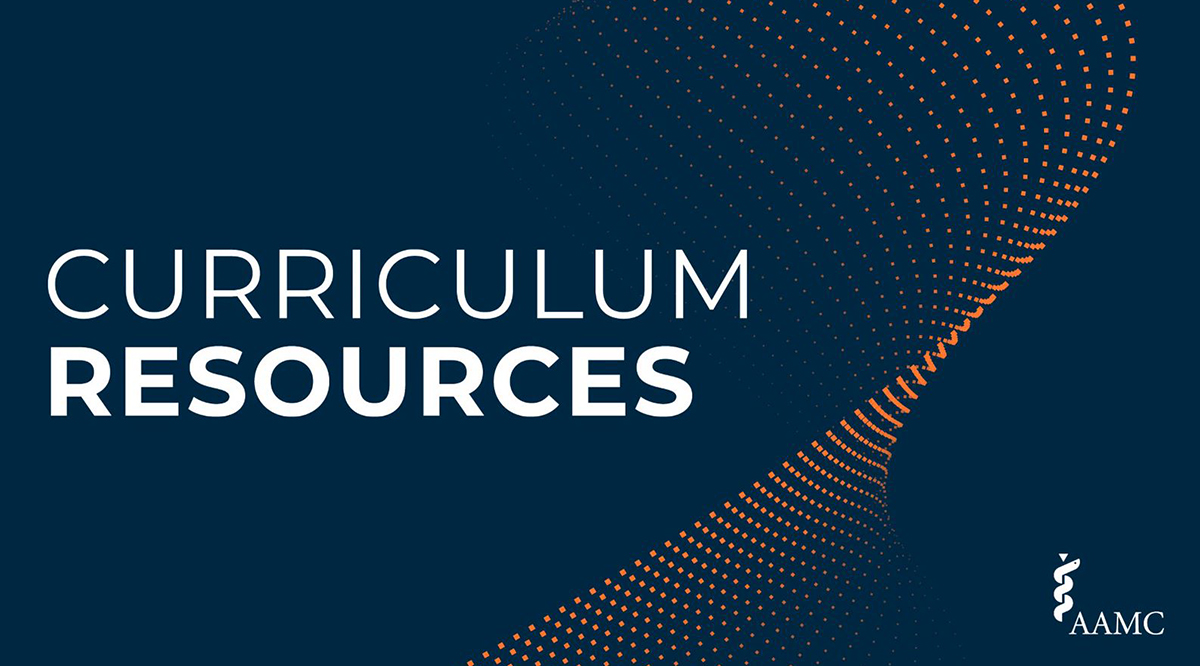Curriculum Resources

The Association of American Medical Colleges (AAMC) is committed to advancing the medical education curriculum. We engage and connect with our community, use data and reports strategically, and develop shared resources to support our members.
Meet our Team and Curriculum Committee
Our committee, comprised of faculty and staff from the AAMC and the American Association of Colleges of Osteopathic Medicine (AACOM) member institutions, advances shared goals related to resources, best practices in curriculum, and data collection and use. Get in touch with our team to learn more about AAMC curriculum resources.
Stay Connected
Curriculum Virtual Community
Our online community, with more than 1200 members, provides a space where those with curriculum roles at medical schools can connect with colleagues, post and answer discussion board questions, access curated resource libraries, attend events, and more.
Access our latest curated Resource Bundles on topics such as accessibility, arts and medicine, climate change, community engagement and collaboration, and more.
Building Better Curriculum webinar series
With around 20,000 total registrants, this regular webinar series highlights schools’ approaches to and innovations in sharing best practices. The webinars cover a range of topics related to curriculum, including development, evaluation, mapping, management, content, and more.
Mapping and Management
Guidebook to Building a Curriculum Map
This workbook for medical school curriculum teams helps to build a curriculum map step-by-step. Each chapter includes highlights, examples, and questions for the team.
Curriculum Keywords (Excel)
Schools may tag their curriculum content with a set of keywords in their mapping systems to help locate and report on content. The AAMC Curriculum Keywords focuses on high-level terms, to make updating keyword tagging as efficient as possible, facilitate tracking across courses and years, support integration, and inform curriculum reports.
Instructional Methods, Assessment Methods, and Resources
Schools may tag instructional methods, assessment methods, and resources within their curriculum mapping systems. Using a set of standardized terms allows for consistency in curriculum mapping for more useful reports. Updates to the list of educational-methods terms is in progress, to ensure it remains relevant and reflective of health professions education methodologies. Learn more.
MedBiquitous Curriculum Inventory Standard
Although the AAMC is no longer collecting curriculum mapping data via the Curriculum Inventory Portal, the curriculum inventory standards and vocabulary lists are still available for school and vendor use. The standards provide a data structure on the content and format of a curriculum map.
Curriculum Data and Reports
Curriculum Reports
Curriculum reports are available from the Liaison Committee on Medical Education (LCME) Annual Medical School Questionnaire, Part II, the AAMC AACOM Curriculum SCOPE Survey, and other sources.
Curriculum SCOPE Survey
The AAMC AACOM Curriculum SCOPE (Structure, Content, Organization, Process, Evaluation) Survey, first administered in 2023, is a questionnaire administered by the AAMC, which collects medical education program data regarding curriculum. Participating medical schools receive a custom report that includes benchmarks, aggregate statistics, and de-identified data for additional analyses.
Scholarship
Scholarship Resources
From guides to webinars, podcasts to publications, the AAMC’s collection of professional development resources provides information about participating in scholarship as an author and/or a reviewer. Review active calls for education scholarship for both meetings and journals.
MedEdPORTAL
Explore the AAMC's open-access, peer-reviewed journal of teaching and learning resources in the health professions. Publications are stand-alone teaching or learning modules that have been implemented and evaluated with medical trainees or practitioners. Modules across a number of topics in undergraduate, graduate, and continuing education are included, such as:
- Artificial Intelligence
- Community Engagement
- Language-Appropriate Health Care and Medical Language Education
Academic Medicine
This peer-reviewed journal serves an international forum for the exchange of ideas, information, and strategies to address the major challenges facing the academic medicine community as it strives to carry out its missions in the public interest.
Select Initiatives
Careers in Medicine
Careers in Medicine is a comprehensive career-planning program that provides students with the skills, information, and resources to choose a specialty and residency program that meets their career goals.
Competency-Based Medical Education (CBME)
The AAMC continues to support the development and implementation of CBME.
Transition to Residency
The AAMC is developing resources and tools to support all involved in a student’s transition to residency.
Visiting Student Learning Opportunities™ (VSLO®)
This program enables medical and public health students to pursue short-term learning opportunities in locations away from their home institutions. Program participants include medical and public health students and institutions in the U.S. and around the globe.